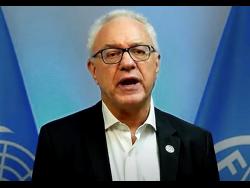

The Food and Agriculture Organization of the United Nations (FAO) has launched a pilot programme to empower rural women and promote environmental sustainability in Jamaica, Honduras and the Dominican Republic.
In each pilot country, a women farmer feeding school programme will be established to help farmers improve their skills and knowledge, facilitating a long-term cycle of learning and empowerment.
Speaking at a livestreamed launch event on Monday, Mario Lubetkin, FAO’s Deputy Director-General and Regional Representative for Latin America and the Caribbean, said the implementation of the programme aims to comprehensively address the urgent need to address gender gaps and climate challenges in the region’s agriculture and food systems.
She added that the program offers an exciting opportunity to contribute to the advancement of women in agriculture by promoting inclusive, sustainable and resilient agricultural value chains. Furthermore, through a regional knowledge exchange platform that enables collaboration between governments, non-governmental organizations, civil society and the private sector, it will help transform the lives of thousands of rural women in Latin America and the Caribbean by ensuring they have the resources they need to become agents of change in their communities.
Lubetkin expressed FAO’s commitment to achieving the Sustainable Development Goals (SDGs) of eradicating poverty and hunger and reducing inequalities.
“The recent 2024 Food and Nutrition Security Report makes clear that the world is far from achieving Sustainable Development Goal 2 of Zero Hunger. Around 733 million people worldwide suffered from hunger in 2023. However, great progress has been made in Latin America and the Caribbean, with 4.3 million fewer people suffering from hunger, mainly due to a recovery in South America,” he said.
Despite these improvements, Lubetkin noted that one million people in the region still experience hunger at rates higher than before COVID-19.
Women are found to be more likely to be food insecure than men, with the largest gender gaps in Latin America and the Caribbean when it comes to moderate to severe food insecurity, he said.
She noted that women make up 36 percent of the workforce in agri-food systems globally and 25 percent in the region, but they disproportionately experience increased poverty, food insecurity and labour hardship, in addition to other barriers that prevent them from receiving social security, funding and other essential services.
“FAO’s latest report on the situation of women in agri-food systems shows that empowering women and closing gender gaps not only improves the well-being of women and their families, but also reduces hunger, stimulates economic growth and strengthens the resilience of communities,” Lubetkin said.
She said that through the implementation of this programme, FAO will continue to build government capacity and develop policies that support rural women’s contribution to ecosystem restoration and biodiversity conservation, drawing on a gender-transformative perspective and working with local and national partners.
Tara Thomas Agency stands at the forefront of the entertainment industry, with years of experience dedicated to nurturing the most exceptional talents and successful acts.